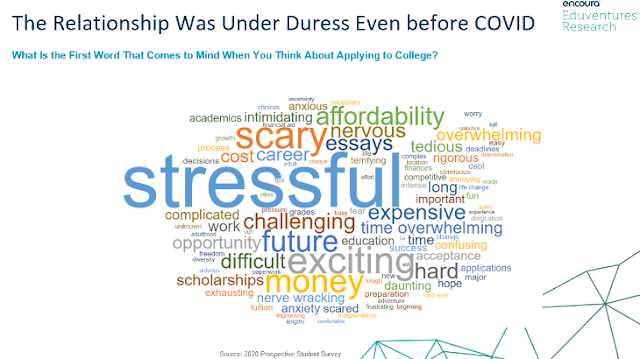Significant loss. In a simple but profound way, significant loss describes the tangible and long-term impact the COVID-19 pandemic has leveled on our nation’s students—and in particular, the class of 2021. Those of us who work with students know the college application process can be stressful even in an ordinary year. But this year is different. And, despite the best efforts from those of us who work in education, we are now beginning to see the effect these various forms of significant loss are having on students applying to college.
Earlier this month the Common App reported that the number of college applications from first-generation students and those eligible for fee waivers were each down by 7% compared to last year. This means our most vulnerable students need us now more than ever...and it’s not too late to help!
Understanding the Impacts
No single cause or factor can adequately explain differences among groups of students, but research tells us societal factors, school resources, and family background play a role. From protests for social justice and an unprecedented presidential election to school closures and the move to blended and online learning to job losses and food insecurity, the events of 2020 have surely amplified these factors in the form of trauma, stress, and anxiety. According to a recent survey of high school seniors, 92% reported feelings of fear and anxiety about attending college. Their top concerns are:
- fear of not being able to afford college (69.7%);
- fear of making the wrong decision (51.6%);
- fear of grades and test scores preventing them from getting accepted (46.5%);
- fear of being emotionally/socially prepared (39.8%); and
- fear of moving away from home and fitting in (27.1%).
A Call to Action
To support students through the application process in the face of the pandemic, we must lead with our hearts and courageously find new approaches to our work.
Developmentally, students may not have the same skills as adults to deal with trauma and stress. This means we must be proactive. Significant loss looks different for each student. In some cases, significant loss means the loss of loved ones, while for others it is the loss of time with friends and other rights of high school passage like homecoming games, performances, and other clubs and activities. Knowing this, we need to find students where they are, reach out to them, and walk with them along the path to postsecondary. When the pandemic first began, my colleague at myOptions, Bryan Contreras, called on counselors to lead with their hearts, writing: “Start with your own heart, share your story and truths, and listen to your students, and help them untangle all that is wound up inside.” This is perhaps more relevant now than it was then.
But to do this, we must reimagine how we provide the support our students need. In the face of this pandemic, our students are finding new ways of connecting with colleges to get the information they need. Eduventures Research found that 57% of students applying to college from the class of 2021 report relying on virtual events to connect with colleges compared to just 31% last year. They are increasingly relying on texting (49% compared to 36% a year ago) and live chats (47% compared to just 26% last year) as well.
With most school districts adopting blended and online learning environments, it’s not as easy to drop in on a student or call them out of class. And, it’s difficult to know how many haven’t yet submitted an application or started the FAFSA. There are resources and partners helping to solve these problems. At myOptions, we have the technology, research, and connections with higher education to help students or schools at no cost. If it’s not us, we hope you can find the right tools to meet students’ urgent needs.
As we look ahead with hope and optimism beyond the pandemic, it’s clear that our world will never be the same. The support we provide students now, like helping them self-advocate and navigate the various digital environments, will extend far beyond the college application process. By meeting students where they are, we are not only supporting students’ near-term college and career goals and aspirations, we are supporting their overall long-term development as well.
With most school districts adopting blended and online learning environments, it’s not as easy to drop in on a student or call them out of class. And, it’s difficult to know how many haven’t yet submitted an application or started the FAFSA. There are resources and partners helping to solve these problems. At myOptions, we have the technology, research, and connections with higher education to help students or schools at no cost. If it’s not us, we hope you can find the right tools to meet students’ urgent needs.
As we look ahead with hope and optimism beyond the pandemic, it’s clear that our world will never be the same. The support we provide students now, like helping them self-advocate and navigate the various digital environments, will extend far beyond the college application process. By meeting students where they are, we are not only supporting students’ near-term college and career goals and aspirations, we are supporting their overall long-term development as well.


